CSotD: Let’s Take a Little Funny Space
Skip to comments
The world is full of weighty matters, but we’re going to, in the words of Eddy Arnold, make the world go away and get it off our shoulders. And, yes, I know it was written by Hank Cochran, but this is being written by me and we’re not picking nits today.
Okay, we are. But not that one.
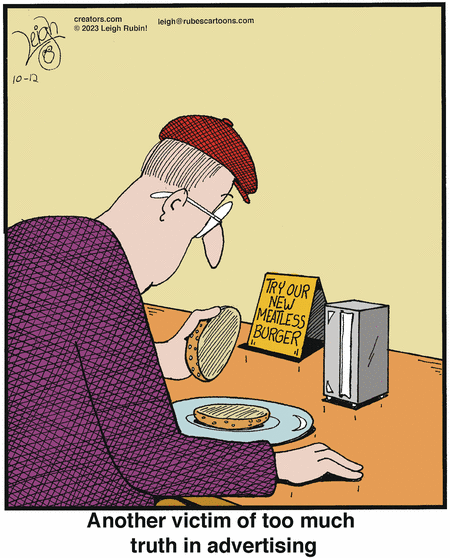
Today we’re celebrating liberation, because Leigh Rubin’s vision in Rubes (Creators) is only one solution to a growing problem.
I had a $25 hamburger the other night in San Francisco, though I shouldn’t complain about the price because it came with French fries.
I’m capitalizing the F in French fries because that’s how you handle dog names. That is, the names of dog breeds are lower case except when they are proper nouns, so you would write “cocker spaniel” but “Labrador retriever.”
Anyway, the trend I decided to be liberated from is that either evolution has happened quickly and we’ve given birth to a whole new generation of people who can unhinge their jaws like pythons or else burgers have simply gone out of control and swollen to the point of being impossible to eat.
Truly meatless would be a good solution, though not my choice.
The latest expansion is that my $25 burger came on a brioche bun, which isn’t really brioche but does add two more inches to the burger’s height, so I said to hell with it and just ate the meat with a fork and knife, on accounta I ain’t no python.
What I am is a rebel.
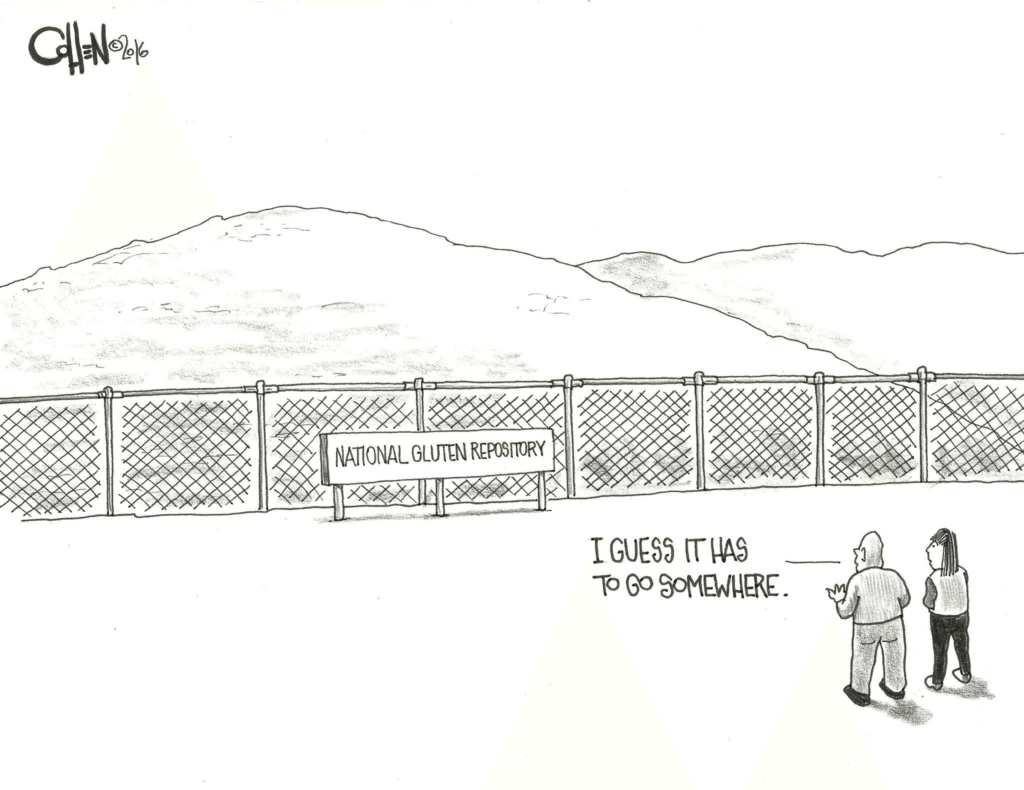
Meanwhile, far from the pythonburgers and at the allegedly healthy end of the spectrum, David Cohen notes the pile up of all the gluten that has been removed from everything in the past few years.
The marketing triumph of the gluten-free movement has been a godsend for the one percent of the population with celiac disease and those who have, or think they have, nonceliac gluten sensitivity.
It seems a shame that, given that 11.3% of Americans truly are diabetic, there isn’t nearly as much shelf space for sugar-free versions of common foods beyond snacks and sodas.
But going back to that first link, our Word of the Day is “nocebo,” which is the opposite of “placebo.” The placebo effect is when someone has a positive reaction to something that isn’t really there, while the nocebo effect is when they have a negative reaction to something that isn’t really there.
Which is to say that, when people who felt they had nonceliac gluten sensitivity were tested, only a third of them had a for-real response to gluten. The others were victims of nocebo.
And of clever marketing.
Here’s more than you wanted to know about it all.
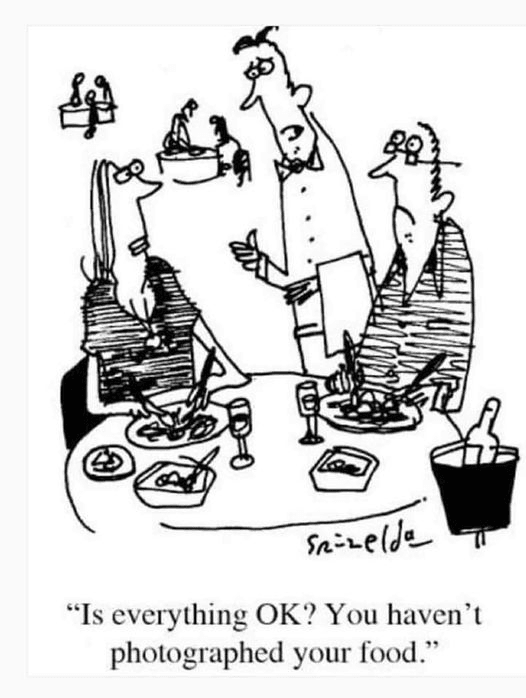
Meanwhile, this is how Grizelda judges fine food.
Restaurants should be like National Parks: They should have gift shops with racks of postcards so that you could purchase a much better photograph than you would be able to take yourself.

Or they could go back to hiring the camera girls who used to go around nightclubs taking photos of people, only have them shoot the food instead and offer you the chance to buy prints.
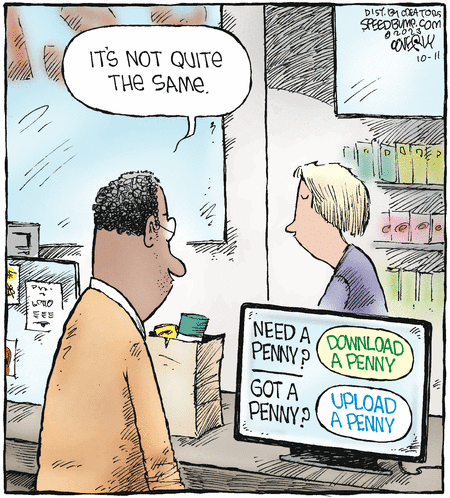
Speed Bump (AMS) happens along with this gag just as I’m back from a road trip on which I discovered my new-found ability to ignore those screen-generated requests for tips, in large part because the airport shops where you can buy a bottle of orange juice for five bucks or a stale roll-up for $10 won’t even ring it up for you anymore.
Not that I was going to tip them anyway. I know the word isn’t really an acronym for “To Insure Prompt Service” but it should require something more than taking your money.
Anyway, I used to toss pennies into the penny thingie and occasionally dig one out to round up to the nearest nickel, but since I don’t carry cash anymore, it is a vestige of ancient times.
Which reminds me that the coin-counting machines in stores now give you the option, instead of getting a receipt to cash in at the check-out, of exchanging your loose change for bitcoin.
This is an excellent option, since the contents of your change jar weigh too much to just flush it all down the toilet.
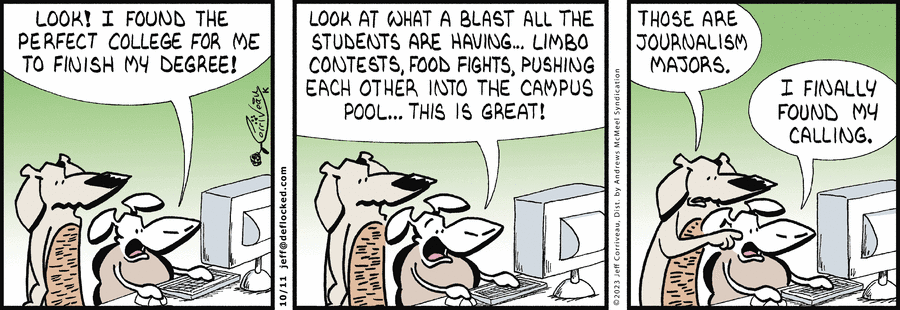
Judging from this Deflocked (AMS), Jeff Corriveau holds journalism degrees in somewhat lower regard than I do, and I didn’t think that was possible.
It’s not so much that I think of it as a jock major, though I’m not sure why I don’t, given that, back in the day, Mass Comm was a famously jock major.
But I do think of it as, at best, a job training process you should add after majoring in something you want to write about, preferably as a masters in a five-year package, and then only because it has become necessary.
Old school editors used to hire people who seemed smart and literate, but now applications go to HR where they look to see your sheepskin before anyone bothers to glance at your tearsheets. The editor doesn’t even meet anyone who hasn’t punched the correct tickets.
The best reporter I ever had working for me didn’t have a degree in anything, but she was a good listener and a helluva storyteller. I had another who was dyslexic, but talented enough that I was willing to learn how to unjumble her copy.
Mind you, I had the advantage of working at small papers where we couldn’t afford to hire j-school graduates. Fortunately, we also couldn’t afford to have a HR department screening applicants.

On a related topic, some of the most successful sales people I’ve known had very little understanding of their product but a talent for schmoozing, which brings us to Linda Yaccarino, purported CEO of X-Twitter-whatever.
As noted at Joy of Tech, she’s in a thankless, hopeless position in which her only tactic is to keep saying how well thing are going despite the obvious fact that they aren’t. And as long as she doesn’t go onto public forums and make an ass of herself, that will work as well as anything.
The trick to mocking Yaccarino being that you have to tone it all down to make it even marginally believable.
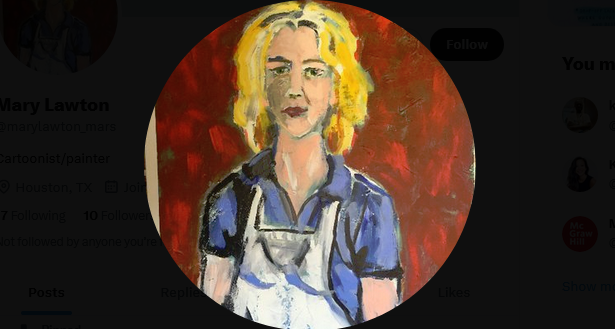
Comments 4
Comments are closed.